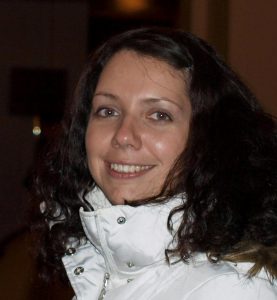Community Spotlight: Lidia Kulemina, PhD, Kerafast Fellow at the University of Florida
The Kerafast fellowship program provides scientists with real-life experience in technology commercialization, helping them develop skills for careers on the business side of life science. Our fellows work onsite at select providing institutions to identify, characterize and eventually commercialize novel research tools created by other scientists at their institution.
One such fellow is Dr. Lidia Kulemina, a postdoctoral associate at the University of Florida. She joined the fellowship program, jointly offered by Kerafast and the UF Office of Technology Licensing, in the fall of 2016 and has been working to identify research tools that might be a fit for the Kerafast platform. She helped start the program at UF and worked with Dr. Edward K. Chan to make his AGO2 Antibody the first UF reagent available through the Kerafast program.
Below, Lidia describes – in her own words – her own research interests and challenges, as well as why her experiences drew her the Kerafast fellowship program. Read on for her take on the importance of sharing research tools and what she’s learned so far from the fellowship.

Lidia Kulemina, PhD,
University of Florida
As a postdoc, I am working on several projects. The first one is focused on understanding the mechanisms behind early events leading to DNA damage and cancer. Some of the questions we are trying to answer include: how metabolic reprogramming starts, what happens when there is DNA damage already present, and if there are ways to harness metabolic enzyme dysregulation in the context of missing tumor suppressor genes. Another project is dedicated to regulation of thymidylate synthase and finding new alternatives to existing therapies for pancreatic cancer. It is a humbling experience, however. Biology has intricate ways of antagonizing the assault on the system, which makes targeting a pathologic process inside the cell particularly difficult. This is especially true when the system is already dysregulated, such as in cancer.
I’ve always been very supportive of programs for sharing research tools, as they accelerate the process of scientific discovery and help us all do better science. What I really like about the Kerafast program –and what makes it stand out – is that it rewards the scientists who spent long hours developing research materials in the lab. What I also like about this program is that it increases the transparency of our work, helping us validate the findings and truly join forces toward developing a more complete and accurate understanding of nature. Having those extra resources early-on in the form of a right construct, or cell line, or antibody can have a tremendous impact on the success of a research study (and career).
As a Kerafast fellow, I see my role as primarily educating the research community about this resource for scientists and serving as a liaison between academic researchers, University of Florida Office of Technology Licensing, core laboratories at UF, and Kerafast. I was excited to apply to the Kerafast fellowship program because I like their mission. It provides much-needed exposure to the commercial world for research scientists and I’ve had a great experience working with the team.
The Kerafast fellowship was a complete 180⁰ from my prior experience and a great way to challenge myself. I’ve learned a lot about technology commercialization, the licensing process, what constitutes intellectual property, how sales and marketing teams help bring research products to the greater scientific community, and many other things. I also get to meet a lot of bright people, which is always interesting and rewarding, and even got some ideas to try for my own research from working with Dr. Chan.
I am hoping to help expand the Kerafast program at University of Florida and facilitate more collaboration between the scientists here in Florida and our Office of Technology Licensing to bring these resources to others.
________________________________________________________________________
For more information about Kerafast fellowships, or if you are interested in bringing the program to your university, please contact us at community@kerafast.com.
For more information on Dr. Edward K. Chan’s AGO2 antibody, read on for Lidia’s description:
The Argonaute-2 (AGO2) Antibody from the Chan laboratory recognizes proteins involved in the RNA induced silencing complex (RISC) and can be used for study of RNA processing and post-transcriptional gene silencing machinery in the cell. Gene silencing is a crucial regulatory mechanism controlling which genes get to be expressed and manifest their biological function in the cell. It is exerted through microRNAs, small 21-24 nucleotide-long RNA molecules capable of binding complementary regulatory regions of messenger RNA (mRNA), resulting in translation suppression or mRNA degradation. Argonaute proteins are key components of the RISC complex and AGO2 is thought to be the main mediator of microRNA-induced mRNA processing. In the original paper by the Chan lab, AGO2 antibody was used to capture AGO-associated miRNAs in mammalian cells to study miRNA implications in novel cytoplasmic compartments known as GW bodies (GWB). Dr. Chan’s laboratory is interested in understanding the biology of GWB formation and regulation, as well as the implications for gene regulation, autoimmunity and cancer.


